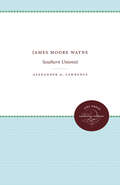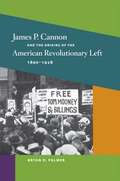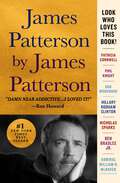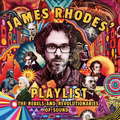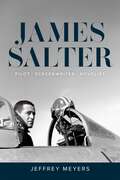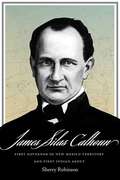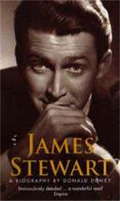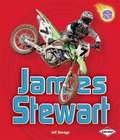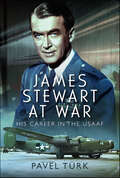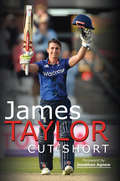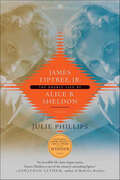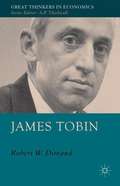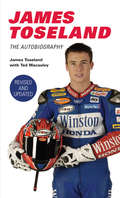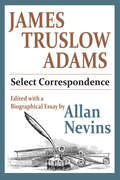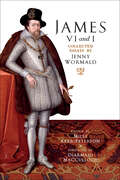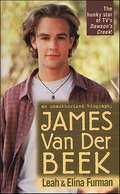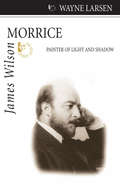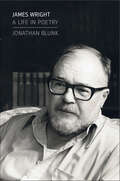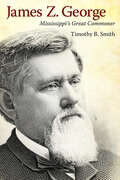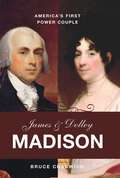- Table View
- List View
James Moore Wayne: Southern Unionist
by Alexander A. LawrenceSouthern aristocrat, mayor of Savannah, congressman for three terms, justice of the Supreme Court of the United States, James Moore Wayne made love of the federal union the governing principle of his political and judicial career. Here is shown the impact of this southern unionist upon the Supreme Court during the critical period from 1835 to 1867.Originally published in 1943.A UNC Press Enduring Edition -- UNC Press Enduring Editions use the latest in digital technology to make available again books from our distinguished backlist that were previously out of print. These editions are published unaltered from the original, and are presented in affordable paperback formats, bringing readers both historical and cultural value.
James Nasmyth: Engineer - an Autobiography
by Samuel Smiles James NasmythAutobiography of the mechanical inventor
James Otis the Pre-revolutionist
by John Clark RidpathTHE LIFE OF AN IMPORTANT BUT NEGLECTED PARTICIPANT IN THE aMERICAN REVOLUTION.
James P. Cannon and the Origins of the American Revolutionary Left, 1890-1928 (The Working Class in American History)
by Bryan D. PalmerBryan D. Palmer's award-winning study of James P. Cannon's early years (1890-1928) details how the life of a Wobbly hobo agitator gave way to leadership in the emerging communist underground of the 1919 era. This historical drama unfolds alongside the life experiences of a native son of United States radicalism, the narrative moving from Rosedale, Kansas to Chicago, New York, and Moscow. Written with panache, Palmer's richly detailed book situates American communism's formative decade of the 1920s in the dynamics of a specific political and economic context. Our understanding of the indigenous currents of the American revolutionary left is widened, just as appreciation of the complex nature of its interaction with international forces is deepened.
James Patterson by James Patterson: The Stories of My Life
by James PattersonHow did a kid whose dad lived in the poorhouse become the most successful storyteller in the world? This "fizzing, funny, often deeply moving" (Daily Mail) #1 New York Times bestselling memoir is &“damn near addictive. I loved it . . . that Patterson guy can write!&” (Ron Howard) On the morning he was born, he nearly died. His dad grew up in the Pogey– the Newburgh, New York, poorhouse. He worked at a mental hospital in Massachusetts, where he met the singer James Taylor and the poet Robert Lowell. While he toiled in advertising hell, James wrote the ad jingle line &“I&’m a Toys &‘R&’ Us Kid.&” He once watched James Baldwin and Norman Mailer square off to trade punches at a party. He&’s only been in love twice. Both times are amazing. Dolly Parton once sang &“Happy Birthday&” to James over the phone. She calls him J.J., for Jimmy James. How did a boy from small-town New York become the world&’s most successful writer? How does he do it? He has always wanted to write the kind of novel that would be read and reread so many times that the binding breaks and the book literally falls apart. As he says, &“I&’m still working on that one.&”
James Rhodes' Playlist: The Rebels and Revolutionaries of Sound
by James RhodesA visually stunning introduction to classical music from piano maestro and bestselling author James Rhodes."Rhodes makes classical music accessible, relatable, and exciting. It is hard not to be swept up - Rhodes writes with such enthusiasm and thoughtfulness that readers will be dying to listen to the Spotify playlist he shares ... Rhodes makes history and music come alive. Surreal, psychedelic collages ... make the book an eye-popping visual experience as well. A dynamic and infectious introduction to classical music." - Kirkus Bach. Mozart. Beethoven. Old guys with curly wigs, right? But trust me: those composers were the original rock stars. Let me introduce you to some of the most breathtaking and magnificent pieces of music ever created. We'll meet the rebels and revolutionaries who wrote them - did you know Beethoven peed into a chamber pot he kept under his piano? - and find out why they're responsible for every track on your phone today. The world of classical music is going to blow your mind. So take some time out to listen to the online playlist I've curated for you as you read. Bach, Mozart, Beethoven, Chopin, Schubert, Rachmaninoff and Ravel: the perfect introduction to classical music.With jaw-dropping artwork and avant-garde design, this visually exquisite celebration of classical music is encased in a stunning slipcase and features a large fold-out poster as well as an accompanying online playlist of the pieces being discussed. It's the perfect gift for older children and adults alike who want to explore classical music, but aren't quite sure where to begin.
James Russell Lowell
by Martin DubermanBiography of James Russell Lowell (1819-1891): poet, critic, editor, teacher, diplomat, friend of freedom and a man of warmth, wit and integrity. This biography by noted historian Martin Duberman, was a finalist for the 1967 National Book Award for History and Biography.
James Salter: Pilot, Screenwriter, Novelist
by Jeffrey MeyersBiographer and critic Jeffrey Meyers knew the novelist James Salter (1925–2015) during the last decade of his life, visited him twice on Long Island, and received eighty letters from him. Meyers’s knowledge of Salter’s life provides many new insights about the personal, literary, and historical background of his work. This appreciative book, the first full-length study in twenty-six years, is intended to introduce Salter to new readers and show his achievement as a writer of novels, stories, screenplays, memoirs, and travel essays. Salter had an extraordinary range of experience as West Point graduate; fighter pilot in the Korean War; downhill skier, rock climber, and mountain climber; screenwriter and film director; connoisseur of food and wine; world traveler and sophisticated observer. In an elegant blend of literary criticism and intimate memoir, with crisp prose and an eye for telling detail, Meyers discusses Salter’s family and friends; the significance of his book and chapter titles; characters’ names and cultural allusions; literary influences, especially Ernest Hemingway and F. Scott Fitzgerald; development of his fictional style and techniques; awareness of weather and light; supreme delineation of sexual ecstasy; recurrent themes of war and love; strange career and late recognition. A detailed chronology tracks the key dates and events in Salter’s life, and a chronological bibliography shows the development of his literary reputation. For Meyers, Salter’s lyrical evocation of people and places, of luxurious decadence and the danger of death, are unsurpassed in contemporary literature. This book appears just before the centenary of Salter’s birth.
James Silas Calhoun: First Governor of New Mexico Territory and First Indian Agent
by Sherry RobinsonVeteran journalist and author Sherry Robinson presents readers with the first full biography of New Mexico&’s first territorial governor, James Silas Calhoun. Robinson explores Calhoun&’s early life in Georgia and his military service in the Mexican War and how they led him west. Through exhaustive research Robinson shares Calhoun&’s story of arriving in New Mexico in 1849—a turbulent time in the region—to serve as its first Indian agent. Inhabitants were struggling to determine where their allegiances lay; they had historic and cultural ties with Mexico, but the United States offered an abundance of possibilities.An accomplished attorney, judge, legislator, and businessman and an experienced speaker and negotiator who spoke Spanish, Calhoun was uniquely qualified to serve as the first territorial governor only eighteen months into his service. While his time on the New Mexico political scene was brief, he served with passion, intelligence, and goodwill, making him one of the most intriguing political figures in the history of New Mexico.
James Stewart
by Donald DeweyIn this penetrating and riveting biography of one of Hollywood's most beloved screen icons, Donald Dewey probes beneath Jimmy Stewart, the conservative image and ideal, to reveal James Stewart, the actor and the man. Through hundreds of interviews and in-depth analysis of his seventy-five films, the author assesses how the Hollywood man-about-town of the 1930's and 40's - Stewart's lovers included Ginger Rogers, Olivia de Havilland and Marlene Dietrich - became the epitome of American family values who remained married for forty-five years; and how the studio-bred, effervescent star of It's a Wonderful Life developed into the brilliant actor whose performances in films such as Vertigo and Shenandoah exposed a vulnerability unseen in his personal relationships. With many insights into the turmoil of his private life, the artistry behind his cinematic craft and his heroic military record in the Second World War, Dewey gives us much more than a legend to love.
James Stewart
by Donald DeweyIn this penetrating and riveting biography of one of Hollywood's most beloved screen icons, Donald Dewey probes beneath Jimmy Stewart, the conservative image and ideal, to reveal James Stewart, the actor and the man.Through hundreds of interviews and in-depth analysis of his seventy-five films, the author assesses how the Hollywood man-about-town of the 1930's and 40's - Stewart's lovers included Ginger Rogers, Olivia de Havilland and Marlene Dietrich - became the epitome of American family values who remained married for forty-five years; and how the studio-bred, effervescent star of It's a Wonderful Life developed into the brilliant actor whose performances in films such as Vertigo and Shenandoah exposed a vulnerability unseen in his personal relationships. With many insights into the turmoil of his private life, the artistry behind his cinematic craft and his heroic military record in the Second World War, Dewey gives us much more than a legend to love.
James Stewart
by Jeff SavageJames Bubba Stewart is one of the fastest men in Super cross motorcycle racing. He has dominated dirt tracks ever since he was in elementary school. But James didn't become a great racer overnight. He practiced every day in his own backyard, from age 3 on. Through this experience, he developed the skills that helped him win the World Supercross title in his first full season of competition in 2006. His courage, strength, and skill make him almost impossible to beat.
James Stewart at War: His Career in the USAAF
by Pavel TürkExplores the story of one star of the Silver Screen’s role in the Second World War James Stewart was already a Hollywood star when the United States went to war in December 1941. Having received an Academy Award for Best Actor in 1940 for his role in The Philadelphia Story, he had become a familiar face to movie goers by the time that the Japanese struck at Pearl Harbor. By that time ‘Jimmy’ had already received his private pilot’s license and when his name was drawn by the Drafting Commission on 29 October 1940, he applied to join the US Army Air Corps. He continued his pilot training and just twelve days before he received his draft, he had obtained his commercial pilot’s license. It was on 18 January 1942, that the Hollywood star was called into active duty. Jimmy was transferred to the 929th Bombardier Training School, based at Kirtland Field in New Mexico, on 19 August 1942. There he served as a pilot almost until the end of the year. Though his film company had managed to secure a ‘static personnel’ role, Jimmy was determined to fly in combat. So it was that Captain James Maitland Stewart was appointed as the Commander of the 703rd Bombardment Squadron. Finally, on 17 November 1943, he landed in the UK and his operational war began. Flying in a Consolidated B-24 Liberator, Jimmy undertook his first bombing mission on 13 December 1943, the target on this occasion being the German U-boat facilities at Kiel. Just seven days later he was once again sent to attack a target in Germany, this time the port of Bremen. A further eighteen missions followed over the following fifteen months. Stewart took part in raids against targets across Germany, including Berlin, all of which are analyzed in detail along with a fabulous collection of photographs of the aircraft Jimmy flew and the men he flew with. His contribution to victory over Germany was not confined to flying B-24 bombers, He also functioned as an Operations Officer for a period and led the Liberators of the 2nd Combat Bomb Wing to an attack on the railway marshaling yards at Halle from the navigator’s seat of a de Haviland Mosquito. James Stewart rose to the rank of major from private in just four years, an achievement few can claim. He was awarded the Distinguished Flying Cross for his actions as deputy commander of the 2nd Bombardment Wing, and the Air Medal with three oak leaf clusters. The French bestowed him with the Croix de Guerre with palm. Having risen to the rank of lieutenant colonel, James Stewart returned to the silver screen after the war. He continued to play a role in the Army Air Forces reserve, during which period he was promoted to brigadier general. In so doing, Stewart became the highest-ranking actor in American military history.
James Taylor: Cut Short (Authentic Guitar-tab Editions Ser.)
by James TaylorA superstar athlete&’s inspiring autobiography—from his cricket-loving youth to the diagnosis of a career-ending heart condition and its aftermath. James Taylor was born in Burrough on the Hill, Leicestershire, in 1990. A sporting phenomenon from an early age, he chose to forge a life in cricket, establishing himself as one of the country&’s leading batsmen and an England regular. And then tragedy struck. In April 2016, a serious heart condition left Taylor fighting for his life in the changing room. Told he faced possible death if he played cricket, or exercised, ever again, James&’s bright and brilliant career was over at the age of 26. In Cut Short, Taylor reveals his route to the top. On the way, he describes how he encountered prejudice against his size and takes us through the highs and lows of his international career, including a century against the Australians and a closeup view of the unsavory nature of David Warner. With the world at his feet, Taylor reveals just what it was like to have sporting ambition snatched away right at the point of international breakthrough. He relives in breathless detail the horrific events of the day he thought he was going to die and his desolation at watching a fine sporting career torn from his grasp. At the same time he faced a battle to rebuild his life and his future, he was getting used to a body which, on several occasions, left him fearing for his existence. That James has emerged from these dark days with courage, good humor, and renewed ambition is testament to a remarkable personality.
James Thurber: His Life and Times
by Harrison KinneyDiscussion of his work in the context of his times.
James Tiptree, Jr.: The Double Life of Alice B. Sheldon
by Julie PhillipsJames Tiptree, Jr. burst onto the science fiction scene in the 1970s with a series of hard-edged, provocative short stories. Hailed as a brilliant masculine writer with a deep sympathy for his female characters, he penned such classics as Houston, Houston, Do You Read? and The Women Men Don't See. For years he corresponded with Philip K. Dick, Harlan Ellison, Ursula Le Guin. No one knew his true identity. Then the cover was blown on his alter ego: A sixty-one-year-old woman named Alice Sheldon. As a child, she explored Africa with her mother. Later, made into a debutante, she eloped with one of the guests at the party. She was an artist, a chicken farmer, a World War II intelligence officer, a CIA agent, an experimental psychologist. Devoted to her second husband, she struggled with her feelings for women. In 1987, her suicide shocked friends and fans. The James Tiptree, Jr. Award was created to honor science fiction or fantasy that explores our understanding of gender. This fascinating biography by Julie Phillips, ten years in the making, is based on extensive research, exclusive interviews, and full access to Alice Sheldon's papers.
James Tobin
by Robert W. DimandJames Tobin, 1981 Nobel laureate in economics, was the outstanding monetary economist among American Keynesian economists. This book, the first written about James Tobin, examines his leading role as a Keynesian macroeconomist and monetary economist, and considers the continuing relevance of his ideas.
James Toseland: The Autobiography
by James Toseland Ted MacauleyAt 23, James Toseland was the youngest ever winner of the World Superbike Championship and with more racing experience than riders twice his age, has overtaken previous champions Carl Fogarty and Neil Hodgson to become the next biking superstar. Toseland's success has been driven by a lifetime of tragedy. Using racing as a release, he became afearless daredevil and had moved his way up through the ranks of BritishSuperbikes by the time he was sixteen. But there was even more turmoil to come - a career of dramatic crashes and a collision in Monza, Italy which left James seriously injured and his Honda team-mate dead. This is a story of genius, tragedy and James' overwhelming will to succeed.
James Truslow Adams: Select Correspondence
by Allan NevinsThe brilliant historian of the mid-twentieth century, Allan Nevins, introduces this volume of correspondence by and to James Truslow Adams with a summary of his life and importance. This presents his appreciation of Adams in a manner that properly serves as a bridge to a full range of his correspondence, including a long series of letters by Adams himself.The correspondence is divided into a wide network of letters covering two world wars, and highlighting Adams' efforts to speak as a public historian of the age. The range covered extends from World War I, where he participated in the Paris Conference, to the New England histories, the year of the Economic Crash, the making of his great book, The Epic of America, and the final summing up, making history accessible to the larger publics.Both the biographical sketch and the correspondence reflect Adams as possessing a nimble, precise mind and a stubborn set of opinions that are sometimes liberal, while at other times conservative. Despite a lifetime of public service, Nevins and the letters remind us, Adams was and remained essentially a scholar. The same can be said of Nevins himself and that made him the perfect spokesman and student of Adams' writings. For those to whom the meshing of solid American history and public service are of interest this will be an unusual, but entirely worthwhile experience.
James VI and I: Collected Essays
by Jenny WormaldThe renowned historian Jenny Wormald was a ground-breaking expert on early modern Scottish history, especially Stewart kingship, noble power and wider society. She was most controversial in her book-length critique of Mary, Queen of Scots. Unfortunately, Jenny never got round to producing a similar monograph on a monarch she was infinitely more fond of, King James VI and I, before her untimely death in 2015. In the absence of such a book, this volume brings together all the major essays by Jenny on James. She wrote on almost every aspect and every major event of James' reign, from the famous Gunpowder Plot, the Plantation of Ulster, the Gowrie Conspiracy, to the witchcraft panics, as well as James' extensive writings. She wrote extensively on James' Scottish rule, but she was also keenly interested in James as the first king of all of Britain, and many of her essays unpick the issues surrounding the Union of the Crowns and James' rule over all three of his kingdoms. This book is an invaluable resource for any scholar on this crucial time in the history of the British Isles.
James Van Der Beek: An Unauthorized Biography
by Leah Furman Elina FurmanNo wonder this sexy, shy-guy actor is landing the coolest roles in young Hollywood--from Dawson Leery on the WB's Dawson's Creek to quarterback Jonathan "Mox" Moxon in the hit movie Varsity Blues--he's got that aw-shucks, guy-next-door irresistibility (not to mention those baby blue eyes!). James Van Der Beek also happens to be a talented actor who wowed the DC creators with his brilliant audition for the part of the sensitive, introspective Dawson. Now, in this revealing biography, you can get the lowdown on this hot young celebrity, including:What his life is like behind the scenes and off-cameraHow James got his start in actingWhere he plans to go with his budding careerWhat kind of girls he likesAnd much, much more!
James Wilson Morrice: Painter of Light and Shadow
by Wayne LarsenJames Wilson Morrice (1865–1924) was a Canadian painter of extraordinary passion and simplicity whose canvases and oil sketches are valued throughout the world and cherished in Canada as our first real examples of modern art.Though cut short by chronic alcohol abuse, Morrice’s restless bohemian life was spent in constant motion. From the colourful canals of Venice to the sun-drenched markets of North Africa to the snowy streets of Quebec City, he was, as his friend Henri Matisse described him, "always over hill and dale, a little like a migrating bird but without any very fixed landing place."In James Wilson Morrice, Wayne Larsen chronicles the creative but often troubled life of this early cultural icon as he travels in search of the colours, compositions, and subtle effects of light that would inspire a revolution in Canadian art.
James Wright: A Life in Poetry
by Jonathan BlunkThe authorized and sweeping biography of one of America’s most complex, influential, and enduring poetsIn the extraordinary generation of American poets who came of age in the middle of the twentieth century, James Wright (1927–1980) was frequently placed at the top of the list. With a fierce, single-minded devotion to his work, Wright escaped the steel town of his Depression-era childhood in the Ohio valley to become a revered professor of English literature and a Pulitzer Prize winner. But his hometown remained at the heart of his work, and he courted a rough, enduring muse from his vivid memories of the Midwest. A full-throated lyricism and classical poise became his tools, honesty and unwavering compassion his trademark.Using meticulous research, hundreds of interviews, and Wright’s public readings, Jonathan Blunk’s authorized biography explores the poet’s life and work with exceptional candor, making full use of Wright’s extensive unpublished work—letters, poems, translations, and personal journals. Focusing on the tensions that forced Wright’s poetic breakthroughs and the relationships that plunged him to emotional depths, Blunk provides a spirited portrait, and a fascinating depiction of this turbulent period in American letters.A gifted translator and mesmerizing reader, Wright appears throughout in all his complex and eloquent urgency. Discerning yet expansive, James Wright will change the way the poet’s work is understood and inspire a new appreciation for his enduring achievement.
James Z. George: Mississippi’s Great Commoner
by Timothy B. Smith“When the Mississippi school boy is asked who is called the ‘Great Commoner’ of public life in his state," wrote Mississippi’s premier historian Dunbar Rowland in 1901, “he will unhesitatingly answer James Z. George.” While George’s prominence, along with his white supremacist views, have decreased through the decades since then, many modern historians still view him as a supremely important Mississippian, with one writing that George (1826–1897) was “Mississippi's most important Democratic leader in the late nineteenth century.” Certainly, the Mexican War veteran, prominent lawyer and planter, Civil War officer, Reconstruction leader, state Supreme Court chief justice, and Mississippi’s longest-serving United States senator to that time deserves a full biography. And George’s importance was greater than just on the state level as other southerners copied his tactics to secure white supremacy in their own states. That James Z. George has never had a full, academic biography is inexplicable. James Z. George: Mississippi’s Great Commoner seeks to rectify the lack of attention to George’s life. In doing so, this volume utilizes numerous sources, never or only slightly used, primarily a large collection of George’s letters held by his descendants and never used by historians. Such wonderful sources allow a glimpse not only into the life and times of James Z. George, but perhaps more importantly an exploration of the man himself, his traits, personality, and ideas. The result is a picture of an extremely commonplace individual on the surface, but an exceptionally complicated man underneath. James Z. George: Mississippi’s Great Commoner will bring this important Mississippi leader of the nineteenth century back into the minds of twenty-first-century Mississippians.
James and Dolley Madison: America's First Power Couple
by Bruce ChadwickThis revealing new portrait of James and Dolley Madison introduces the reader to America's first power couple. Using recently uncovered troves of letters at the University of Virginia, among other sources, historian Bruce Chadwickhas been able to reconstruct the details of the Madisons' personal and political lives. Chadwick argues that Madison was not a boring, average president, as other historians have characterized him, but a vibrant, tough leader-and a very successful commander in chief in the War of 1812. He contends that Madison, the architect of the Constitution, owed much of his success to the political savvy of his charismatic, much younger wife, whose parties and backdoor politicking make for remarkable stories. And Dolley, through her many social skills, created the dynamic role of First Lady that we know today. Despite their glamorous lifestyle, behind the scenes, the Madisons struggled with family drama: James and Dolley's constant funding of their charming but sociopathic son's misadventures ultimately led to their own financial ruin. Blending the personal and the political, this is a fascinating profile of a couple whose life together contributed so much to the future course of our nation.
